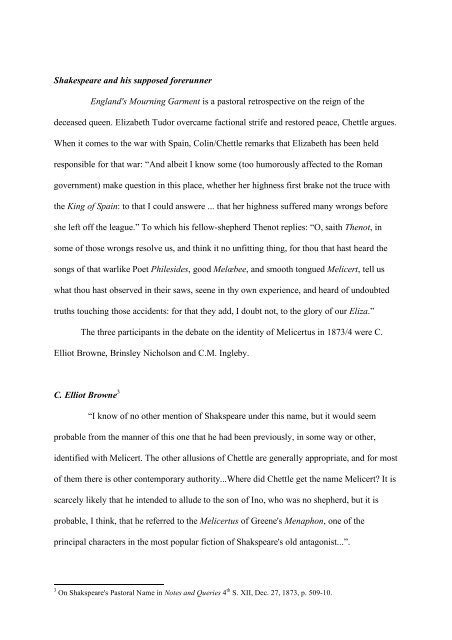Detobel's Collected Essays - Elizabethan Authors
Detobel's Collected Essays - Elizabethan Authors
Detobel's Collected Essays - Elizabethan Authors
You also want an ePaper? Increase the reach of your titles
YUMPU automatically turns print PDFs into web optimized ePapers that Google loves.
Shakespeare and his supposed forerunnerEngland's Mourning Garment is a pastoral retrospective on the reign of thedeceased queen. Elizabeth Tudor overcame factional strife and restored peace, Chettle argues.When it comes to the war with Spain, Colin/Chettle remarks that Elizabeth has been heldresponsible for that war: “And albeit I know some (too humorously affected to the Romangovernment) make question in this place, whether her highness first brake not the truce withthe King of Spain: to that I could answere ... that her highness suffered many wrongs beforeshe left off the league.” To which his fellow-shepherd Thenot replies: “O, saith Thenot, insome of those wrongs resolve us, and think it no unfitting thing, for thou that hast heard thesongs of that warlike Poet Philesides, good Melœbee, and smooth tongued Melicert, tell uswhat thou hast observed in their saws, seene in thy own experience, and heard of undoubtedtruths touching those accidents: for that they add, I doubt not, to the glory of our Eliza.”The three participants in the debate on the identity of Melicertus in 1873/4 were C.Elliot Browne, Brinsley Nicholson and C.M. Ingleby.C. Elliot Browne 3“I know of no other mention of Shakspeare under this name, but it would seemprobable from the manner of this one that he had been previously, in some way or other,identified with Melicert. The other allusions of Chettle are generally appropriate, and for mostof them there is other contemporary authority...Where did Chettle get the name Melicert? It isscarcely likely that he intended to allude to the son of Ino, who was no shepherd, but it isprobable, I think, that he referred to the Melicertus of Greene's Menaphon, one of theprincipal characters in the most popular fiction of Shakspeare's old antagonist...”.3 On Shakspeare's Pastoral Name in Notes and Queries 4 th S. XII, Dec. 27, 1873, p. 509-10.


